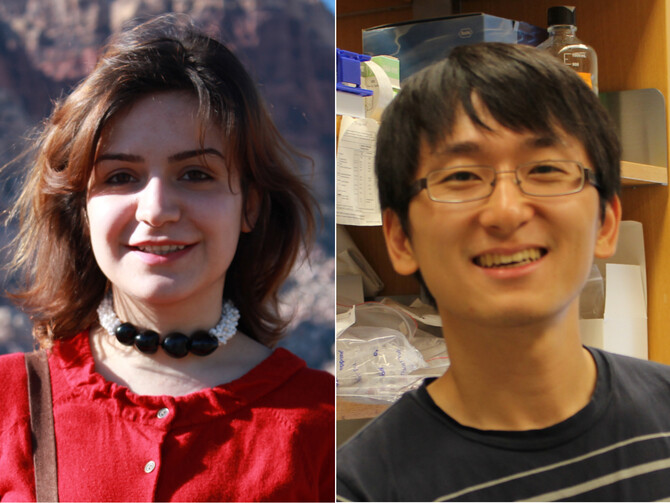Two Penn Students Awarded HHMI International Research Fellowships
Two doctoral students from the University of Pennsylvania, Nam Woo Cho of the Perelman School of Medicine and Maryam Yousefi of the School of Veterinary Medicine, have received International Student Research Fellowships from the Howard Hughes Medical Institute.
They are among 42 Fellows chosen this year from 22 universities in 19 countries. The awards provide $43,000 of support per year to third- or fourth-year Ph.D. students, enabling them to complete their studies in the United States, where it can often be difficult for international students to find funding opportunities.
Maryam Yousefi, a native of Iran, is a third-year Ph.D. student in the lab of Christopher Lengner, an assistant professor of animal biology in Penn Vet’s Department of Animal Biology. Her project examines the relationship of calorie restriction to aging, looking specifically at the effects of diet on stem cell function.
“Several publications have shown that calorie restriction can increase the life span and increase the ability of tissues to regenerate,” Yousefi said. “I’m interested in finding out how metabolism plays a role in controlling the behavior of stem cells.”
Her work will probe the molecular and cellular mechanisms by which calorie restriction may lead to a reduction in aging processes, focusing on these effects in the small intestine.
Nam Woo Cho, a citizen of Canada who was born in South Korea, is an M.D./Ph.D. student in the lab of Roger Greenberg, associate professor of cancer biology in the Perelman School of Medicine. His project deals with the role of telomeres, the ends of chromosomes, specifically in cancer and aging.
“I am studying the determinants of how telomeres are maintained during cell division and in tumor cells,“ said Cho, who is in the third year of his doctoral program. He has finished two years of the M.D. portion of his graduate work. “All tumor cells require telomere maintenance to stay alive.”
Telomeres are often likened to the plastic tips on shoelaces, molecular tips that keep chromosomes from unraveling during cell division.
“We hope that the HHMI award will encourage each student to build on their already considerable accomplishments, to apply creativity to current problems and to explore new ideas, to venture forward without fear and to take risks as they work to solve difficult problems,” said David J. Asai, senior director in science education at HHMI.








